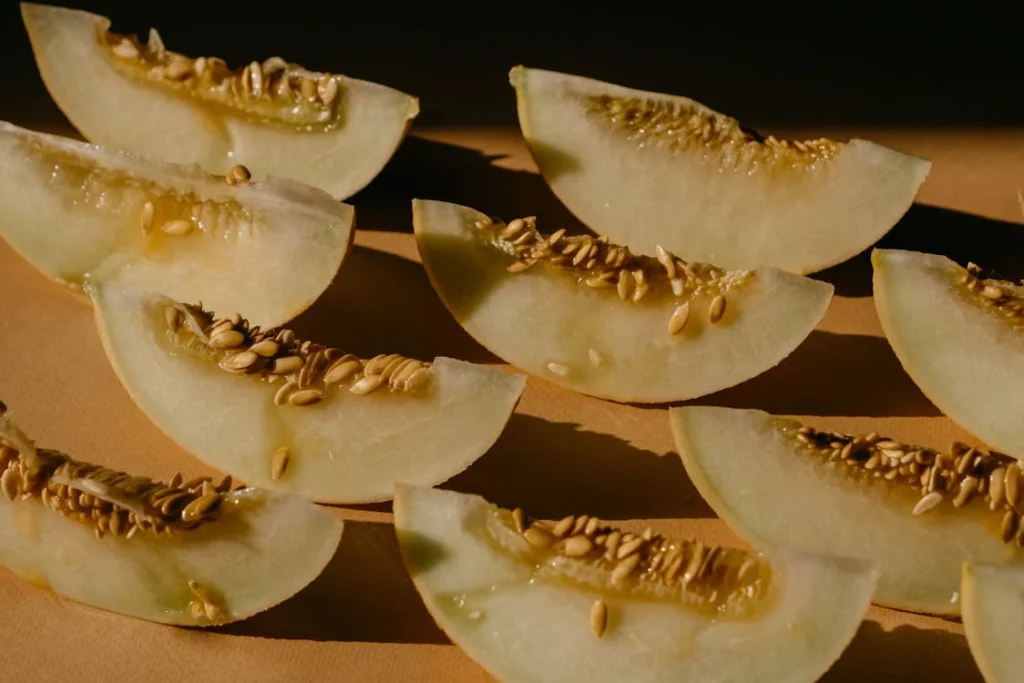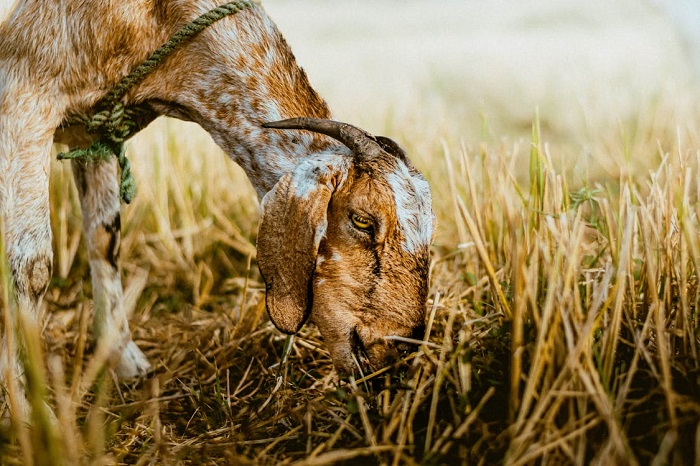Goat owners often find themselves with leftover fruits and vegetables, wondering if these scraps can be incorporated into their caprine companions’ diet. Honeydew melon, with its refreshing sweetness and high water content, might seem like a tempting treat for your goats. But can goats actually eat honeydew melon, and if so, is it a healthy addition to their diet? The answer is yes, goats can enjoy honeydew melon in moderation, but there are some important considerations before offering this juicy treat. This guide will explore the potential benefits and drawbacks of feeding honeydew melon to your goats, along with tips on responsible feeding practices and alternative food options.
The Benefits Of Feeding Honeydew Melon (In Moderation)
Honeydew melon offers some potential benefits for goats when consumed in limited quantities:
- Hydration Boost: Honeydew melon is over 90% water, making it a great way to keep your goats hydrated, especially during hot summer months. This is particularly helpful for pregnant or lactating does who have increased water requirements.
- Digestive Aid: The high fiber content in honeydew melon can aid digestion in goats. Fiber helps regulate their digestive system and keeps their gut bacteria balanced.
- Natural Sugars: The natural sugars present in honeydew melon can provide a quick burst of energy for your goats. However, it’s crucial to remember that too much sugar can disrupt their delicate digestive balance.
- Variety in Diet: Just like humans, goats enjoy a bit of variety in their diet. Occasionally offering honeydew melon can add some excitement to their usual grazing routine. Remember, variety should never compromise their overall balanced diet.
- Vitamin C Source: Honeydew melon contains a small amount of vitamin C, an essential nutrient for overall health and immune function. However, it shouldn’t be considered the sole source of vitamin C in your goat’s diet.
Things To Watch Out For When Feeding Honeydew Melon to Goats
Despite the potential benefits, there are some important considerations when offering honeydew melon to your goats:
- High Sugar Content: Honeydew melon is a relatively high-sugar fruit. Too much sugar can lead to digestive upset, diarrhea, and rumen acidosis, a potentially life-threatening condition.
- Choking Hazard: Large chunks of honeydew melon can pose a choking hazard for goats, particularly younger kids. Always cut the melon into small, manageable pieces before offering it to your goats.
- Pesticide Contamination: Commercially available honeydew melon might have been treated with pesticides or herbicides. These chemicals can be harmful to your goats. Always choose organic honeydew melon or grow your own if you plan to offer it to your goats.
- Diarrhea Risk: Introducing any new food, including honeydew melon, can cause diarrhea in goats. Start with a very small amount and monitor their reaction closely.
- Limited Nutritional Value: Honeydew melon is primarily water and sugar, with minimal protein, essential vitamins, and minerals crucial for a balanced goat diet.

How Often Should You Feed Your Goat Honeydew Melon?
Considering the potential downsides, offering honeydew melon to your goats should be a rare treat, not a regular part of their diet. Here are some guidelines:
- Limited Quantities: If you choose to offer honeydew melon, keep the quantity very limited. A small slice, no more than a few bites per goat, is sufficient.
- Monitor Closely: Always supervise your goats when they have access to honeydew melon. Watch for signs of digestive upset or choking hazards.
- Alternatives Available: There are many safer and more nutritious options available for adding variety to your goat’s diet. Focus on providing a variety of safe browse options and prioritize a balanced commercial feed.
How To Prepare This Food When Feeding Your Goat Honeydew Melon
Since honeydew melon is not a recommended staple food, detailed preparation isn’t necessary. However, here are some basic tips if you do choose to offer it:
- Wash Thoroughly: Wash the honeydew melon thoroughly under running water to remove any dirt, debris, or potential pesticides.
- Cut into Small Pieces: Cut the melon into small, bite-sized pieces to minimize the risk of choking, especially for younger goats.
- Remove Seeds: While not harmful, some goat owners prefer to remove the seeds before offering honeydew melon. This is entirely optional.
- Limited Access: Don’t leave a large amount of honeydew melon available for your goats to nibble on throughout the day. Offer a small amount and remove any uneaten pieces after a short period.
Can Baby Goats Eat Honeydew Melon?
It’s best to avoid giving honeydew melon to very young goats, or kids. Their digestive systems are still developing and can be more sensitive to the high sugar content in honeydew melon. This can lead to diarrhea, bloating, and discomfort. Stick to a milk replacer formulated for kids and age-appropriate commercial feed until their digestive systems mature around 3-4 months old.
What Other Foods Can Goats Eat?
Goats are natural browsers and thrive on a variety of forages, including:
- Grasses: A variety of grasses like orchard grass, brome, and fescue make up a significant portion of a goat’s diet. Ensure the grasses haven’t been treated with herbicides or pesticides before allowing your goats to graze.
- Weeds: Many common weeds like dandelions, clover, and plantain are safe and nutritious for goats. However, always identify weeds correctly before offering them to your goats, as some can be toxic.
- Shrubs: Goat-safe shrubs like willow, hazelnut, and blackberry bushes can be excellent sources of browse. Ensure the shrubs haven’t been treated with herbicides or pesticides before allowing your goats access to them.
- Fruits and Vegetables: Goats can enjoy occasional treats of fruits and vegetables like apples, pears, carrots, and pumpkins. Remember, these should be offered sparingly as treats, not dietary staples.
- Hay: High-quality hay provides essential fiber and roughage, especially during winter months when fresh forage is scarce. Choose hay varieties like alfalfa for growing goats and grass hay for adult maintenance.
Important Note: Always introduce new foods gradually to avoid digestive upset.

How To Give Your Goat A Healthy And Balanced Diet
Creating a balanced diet for your goats is key to their overall health and well-being. Here are some essential components:
- High-Quality Hay: Hay should be the foundation of your goat’s diet, providing them with the necessary fiber for proper digestion. Aim for at least 2-3 pounds of hay per adult goat daily.
- Commercial Feed: A balanced commercial goat feed formulated for their specific age and life stage fills nutritional gaps and ensures they receive essential vitamins and minerals that might be lacking in their regular forage. Follow the feeding guidelines on the feed bag based on your goat’s weight and activity level.
- Fresh Water: Clean, fresh water is vital for all animals, including goats. Ensure they have constant access to a clean water source.
- Mineral Lick: A mineral lick provides essential minerals like calcium, magnesium, and sodium that might be lacking in their regular diet. Choose a commercially available mineral lick specifically formulated for goats.
- Browse: Offering a variety of safe browse options like grasses, weeds, and approved shrubs can enrich your goat’s diet and provide them with mental stimulation. However, prioritize hay and commercial feed for their core nutritional needs.
- Limited Treats: Occasional treats like fruits and vegetables can be offered in moderation. Remember, these are not replacements for a balanced diet.
Consulting a Veterinarian:
For personalized dietary advice specific to your goat’s breed, age, and health condition, consulting with a veterinarian is highly recommended.
Final Verdict: Honeydew Melon – A Sweet Occasional Treat, Not a Staple
Honeydew melon, with its refreshing sweetness, can be a tempting treat for your goats. While they can enjoy it in moderation, it shouldn’t become a regular part of their diet. The high sugar content can disrupt their delicate digestive system and potentially lead to health problems.
Focus on providing a balanced diet rich in high-quality hay, commercial feed, fresh water, and essential minerals. Occasional treats of fruits and vegetables, like a small slice of honeydew melon, can add some variety, but remember, moderation is key. By prioritizing a healthy diet, you’re ensuring your goats have the foundation they need for a long and happy life. After all, a healthy goat is a happy goat, and a happy goat is a curious goat who might just steal your heart!

